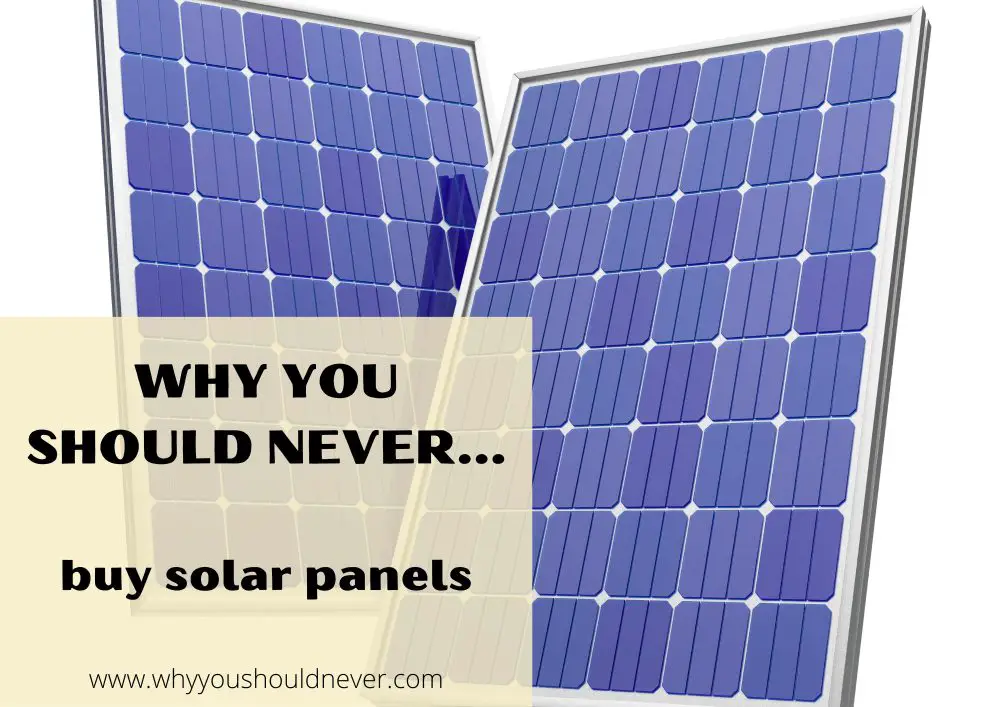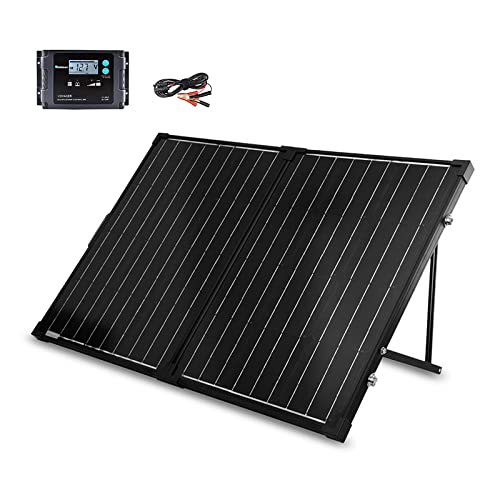![]()
Why You Should Never Buy Solar Panels
Solar panels are an excellent source of renewable energy. In today’s world, where climate change is a major concern, solar panels provide an eco-friendly way to generate electricity.
In recent years, the costs of solar panel installation have decreased significantly, making it a more accessible option for homeowners.
Sounds good so far, right? But are they the right choice for you?
With every pro there are cons, and when it comes to solar panels, there are several of those bad boys, which we’ll touch on in this article.
11 reasons why you shouldn’t buy solar panels
1. Upfront costs
Solar panels may not be the most financially feasible option for homeowners who are on a tight budget. Installing solar panels can cost anywhere between $10,000 and $30,000, depending on the size of your home.
If you want to go full solar and you live in a mansion, you could be looking at a hefty sum for enough panels to service the whole house.
2. Location
Solar panels require a significant amount of sunshine to generate enough energy to power your home. If your home is in an area with limited sunlight or frequent cloud cover, solar panels may not be the most effective option for you.
For example, if you live in Seattle, where the average number of sunny days per year is only 71, you’re probably not going to generate enough energy to power your home solely with solar panels.
3. Maintenance
While solar panels are designed to be durable and long-lasting, they do require regular maintenance to ensure they’re functioning properly. This can include cleaning and checking for any damage, which is both time-consuming and costly.
If you live in an area with heavy rainfall, your solar panels may require more frequent cleaning to remove any debris or buildup that can affect their efficiency.
4. Roof compatibility
Solar panels can only be installed on specific types of roofs. If your roof is not compatible, say it’s made of slate or clay tiles, it might not be able to support the weight of the solar panels without additional reinforcement. You’ll thus have to make costly repairs or replace the entire roof to accommodate the panels.
5. Home value
Although, in many cases, solar panels increase the value of a home, in other cases they could turn off potential buyers who don’t want the added responsibility of maintaining them.
If you plan to sell your home in the near future, you need to consider the potential impact of solar panels on your home’s resale value.
6. Appearance
Let’s be real, solar panels on roofs are… not the prettiest things. While some panels are designed to blend in with the roof, others stand out and look like an eyesore.
It’s all a matter of taste. If your home is quite old with lots of character, sticking solar panels on it will take away from its beauty. This, along with the cost of maintenance, might also put potential buyers off, if you plan on selling.
7. Energy storage
Solar panels generate energy during the day but do not store it for use at night. This means you may still need to rely on traditional energy sources at night or invest in an energy storage system, which can be costly.
For example, if you use a lot of energy at night or during peak hours, you may need to invest in an energy storage system to ensure you have enough energy to power your home.
8. They’re not 100% eco-friendly
While solar panels generate renewable energy, they’re not entirely eco-friendly. The manufacturing process of solar panels produces carbon emissions, and the disposal of old panels can also have negative environmental impacts.
You need to take into account the entire life cycle of the panels, from manufacturing to disposal, to understand the environmental impact.
9. Not an option for renters
Another potential drawback of solar panels is that they’re not usually a viable option for renters. If you’re renting a home or apartment, you likely won’t have the authority to install solar panels, and even if you could, it wouldn’t make sense financially since you don’t own the property.
10. Space
Solar panels need a significant amount of space. In order to generate enough energy to power a home, solar panels have to be installed on a large surface area, such as a roof or a field.
If you have limited space – a small yard or roof – you probably won’t be able to have them installed.
11. They don’t last forever
Nothing lasts forever, I get that, but if you’re spending tens of thousands of dollars on something, you want it to last as long as possible. While solar panels are designed to be durable and long-lasting, they do have a lifespan.
Most solar panels come with a warranty that guarantees their performance for 25 years, but if they’re not being looked after properly or they’re exposed to extreme weather conditions, their lifespan can be shortened.
Over time, solar panels will also become less efficient, which means they won’t generate as much energy as they did when they were first installed. You’ll eventually need to replace them.
Solar panels are often touted as a solution to the world’s energy problems, but they’re not without their drawbacks.
While they can be a great investment for some homeowners, they’re simply not going to be a good fit for many others.
Considering buying a solar panel system? Make sure you weigh the pros and cons carefully before making a decision. Consider your location, budget, and energy needs, as well as the potential maintenance and appearance of the panels.
Try portable solar panels
Portable solar panels are a great, affordable option for renters or anyone who wants to generate their own energy without installing a permanent system. They’re typically smaller and more lightweight than traditional solar panels, and they can be easily moved from one location to another as needed.
Portable solar panels can be used to power small devices like smartphones, laptops, and tablets, or they can be connected to a battery pack to store energy for later use. They’re also a great option for camping or other outdoor activities where access to electricity may be limited.
While portable solar panels may not be as efficient as permanent solar panel systems, they’re an awesome way to generate free energy and save yourself a few bucks on your monthly energy bill.
Many of the drawbacks associated with their permanent counterparts (high upfront costs, the need for maintenance, appearance, etc.) don’t apply to them.




